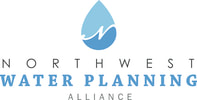|
Each winter, the Chicago region uses more than 270,000 tons of road salt to control ice on roads, parking lots, and sidewalks. While maintaining public safety is absolutely necessary, the amount of salt used is excessive and is polluting our drinking water. Salt concentrations in groundwater have been rapidly rising across the Chicago region since the 1960s. The Northwest Water Planning Alliance (NWPA) is urging municipalities, private contractors, and homeowners to reduce use of road salt to reduce the contamination entering our river and groundwater resources. As a coalition of local and county governments that includes more than 80 communities in the Chicago region, the NWPA was formed to protect the shared water resources to ensure a sustainable water supply. “I commend our members who are actively working to reduce the use of road salt and protect our drinking water,” said Elgin Mayor David Kaptain and NWPA Chairman, “and encourage more communities to join us and save money at the same time.” Using excess salt pollutes our drinking water and damages infrastructure. Once you put salt down, it doesn’t go away. Instead, it travels into waterways, putting aquatic life at risk, and endangering our freshwater. While road salt is not toxic to drink, drinking water can start to taste salty. Salt is very corrosive and can weaken bridges, roads, and water pipes.
Luckily, municipal and county road departments are already taking actions to reduce road salt. Such changes include storing salt properly, calibrating equipment, reviewing operational goals, and using anti-icing techniques to prevent ice for forming in the first place. For example, using brine can reduce salt use by 70 percent. If you see brine lines, you know that your winter maintenance crew is protecting public safety, saving money, and protecting drinking water. Parking lots, driveways, and sidewalks are the next spot to start reducing salt use. The NWPA is developing guidance for sensible salting of parking lots and sidewalks in partnership with the Salt Smart Collaborative. Due out in 2020, this manual will help private contractors and owners of larger parking lots to use best practices and reduce the impacts to water resources. Residents can also reduce road salt pollution. Just a mug of salt is enough to treat an entire 20-foot driveway or 10 sidewalk squares. Other strategies include shoveling before the snow turns to ice. The more snow you remove manually, the less salt you will have to use and the more effective it will be. Sweeping up excess salt from walkways and parking lots, especially before a rain event, prevents salt from washing into our waterways. If you see a store or business overusing salt, direct them to saltsmart.org for more information. For more information, contact Peter Wallers, Chair of NWPA’s Technical Advisory Committee at 630.466.6721 or [email protected], or visit www.nwpa.us.
50 Comments
4/20/2022 04:06:18 pm
The more snow you remove manually, the less salt you will have to use and the more effective it will be. I’m so thankful for your helpful post!
Reply
karan
11/28/2023 10:33:38 pm
Your post emphasizes the importance of make money .For more details,Click here.
Reply
hamza nazim
12/17/2023 08:40:40 am
Your post emphasizes the importance of make money through online health
Reply
2/24/2024 03:55:04 am
Your post emphasizes the importance of budgeting and tracking expenses when pursuing money-making opportunities. It's a foundation for financial success. To explore further, <a href="https://Make Moeny Online Click hare https://www.profitablegatecpm.com/h6ubbqbbg?key=bc2105e0554a0438330a2268825c7633" target="_blank">click here</a>.
Reply
Leave a Reply. |
Archives
May 2020
Categories |
